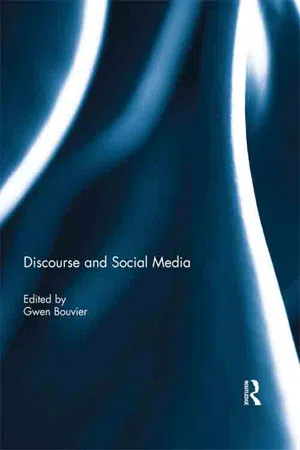
- 136 pages
- English
- ePUB (mobile friendly)
- Available on iOS & Android
Discourse and Social Media
About this book
Discourse and Social Media is a unique and timely collection that breaks ground on how discourse scholars, coming from a range of disciplinary perspectives, can critically analyse different social media, including YouTube, Facebook, Twitter, and News. The book fills a gap in the market for a multi-disciplinary collection for analysing the discourse of social media.
In providing a thorough review of the field to date, the opening chapter considers some of the common and divergent interests and priorities that exist in social media discourse analysis. It also discusses the wider methodological and theoretical implications which social media analysis brings to the process of discourse analysis, as new forms of connections and communication call us to re-think the static models that we have been using. The rest of the collection draws on different traditions in discourse studies, including Critical Discourse Analysis, Sociolinguistics, Pragmatics, Foucaultian analysis and Multimodality, to bring several unique approaches to critically analysing social media from a discourse perspective. Each ground-breaking chapter shows how different forms of social media data can best be selected, analysed, and dealt with critically.
As a whole, Discourse and Social Media provides a go-to resource for social media scholars, as well as graduate students. The book is a significant contribution to the development of the field at this present shifting time. This book was originally published as a special issue of the Journal of Multicultural Discourses.
Information
What is a discourse approach to Twitter, Facebook, YouTube and other social media: connecting with other academic fields
Table of contents
- Cover
- Half Title
- Title
- Copyright
- Contents
- Citation Information
- 1. What is a discourse approach to Twitter, Facebook, YouTube and other social media: connecting with other academic fields
- 2. The pursuit of power in Iraqi political discourse: unpacking the construction of sociopolitical communities on Facebook
- 3. YouTube as a site of debate through populist politics: the case of a Turkish protest pop video
- 4. ‘Should each of us take over the role as watcher?’ Attitudes on Twitter towards the 2014 Norwegian terror alert
- 5. Radicalist discourse: a study of the stances of Nigeria’s Boko Haram and Somalia’s Al Shabaab on Twitter
- 6. Visual forms of address in social media discourse: the case of a science communication website
- 7. Food fight: conflicting language ideologies in English and French news and social media
- Index
Frequently asked questions
- Essential is ideal for learners and professionals who enjoy exploring a wide range of subjects. Access the Essential Library with 800,000+ trusted titles and best-sellers across business, personal growth, and the humanities. Includes unlimited reading time and Standard Read Aloud voice.
- Complete: Perfect for advanced learners and researchers needing full, unrestricted access. Unlock 1.4M+ books across hundreds of subjects, including academic and specialized titles. The Complete Plan also includes advanced features like Premium Read Aloud and Research Assistant.
Please note we cannot support devices running on iOS 13 and Android 7 or earlier. Learn more about using the app